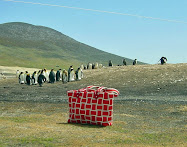
The bee apparently was the oldest emblem of the sovereigns of France and symbolized immortality and resurrection. But Napoleon Bonaparte with his glorious talent for self-invention and legendary personal style appropriated the bee for use on his own insignia, reinscribing it with the notion of the hive, of The Republic with himself at the head. (I hadn’t really thought of Napoleon as Queen Bee before and nor I imagine had he.)
Today, the motif is a gift to interior designers to represent the Empire style. I stayed in a nouveau-Empire themed hotel the other day and couldn’t help noticing the scatter cushions made of black silk woven with these pretty golden insects. Made me feel tres Josephine pour un moment.
The top image comes from an absolutely lush blog called Trouvais (taken from the book 'Fabrics: The Decorative Art of Textiles' by Caroline Lebeau); read more about Napoleon's imperial mantle here; last image from Trouvais. I do recommend it.
To figure out the difference between terms like neo-classical, regency, empire and directoire visit design historian Emily Evans Eerdmans blog here.
* * *
And now, since Spring has finally arrived, with its heavy-scented blossoms I can present Emma Kirkby singing Where The Bee Sucks There Suck I. (For some unaccountable reason this clip starts with some hugely inappropriate remarks but please ignore them because Kirkby's is my favourite version and it is utterly delightful.)
Where the bee sucks, there suck I;
In a cowslip's bell I lie;
There I couch when owls do cry.
On the bat's back I do fly.
After summer merrily, merrily shall I live now. Under the blossom that hangs on the bough.
William Shakespeare
(From 'The Tempest', words spoken by Ariel after he is set free
by Prospero.)






































Until quite late on, certainly after Napoleon, it was thought that Queen Bees were actually King Bees. Quite a lot of figurative language had to be overhauled after the mistake was realised.
ReplyDeleteVB
Thanks Vir, a natural mistake I would have thought in those days..
ReplyDeleteI always thought of Napoleon as the prototype of a Mafia Don, always having to find jobs for the Fredos in his huge extended family; but I guess that really goes all the way back to the Julio-Claudians.
ReplyDeleteThe bee is the perfect emblem for a notorious overcompensator. I wonder if it was a sort of inside joke.
The Kirkby is lovely. That's Purcell?
ReplyDeleteShakespeare-from there all things Spring. I bet we can find every current slang or urbanspeak in his work. that sucks- now we know. Lovely to have you back after tending your own hive and honey. pbt
ReplyDeleterurritable thanks for your usual trenchant view of things. The roman eagle suited him down to the ground as well.
ReplyDeletelittle augury, yes, we can always find the vernacular in Shakespeare but the Americans have the same verbal creativity I find - something I've always envied. Thanks, yes, I am back buzzing round the flora of all my blogging chums again.
ReplyDeleteBees are attracted to Roses...bright ones. Well brightly coloured ones. Nice to have you back in the blogosphere.
ReplyDeleteAh thank you Columnist - that's why I came back. I need this sort of nectar.
ReplyDeleteI did wonder what you would do with that post title.
ReplyDeleteFrom Shakespeare to Napoleon to Emma Kirby~who could
ask for anything more? Lovely.
The beehive is also a Masonic symbol, one that Joseph Smith appropriated for his new Mormom religion in the 19th century.
ReplyDeleteTW thank you. Glad you liked my trajectory!
ReplyDeletemoe99.. thank you, I didn't know that. I am being educated in the comments which can only be good.
ReplyDeleteInteresting about bees as recent emblems as well. Elizabeth Arden famously used a bee on her cosmetic boxes and jars, and the horrible Sarah Ferguson had a bee symbol on her wedding dress when she married the Duke of York in 1986. By coincidence I own the book "Fabrics" by Caroline Lebeau which you reference and it was beside me as I read your blog because I had been looking through it a couple of days ago. So I was delighted to review the full photograph of the image you posted.
ReplyDeleteAh elegance, I had Sarah Ferguson's wedding dress in mind when I wrote this. I wonder if the bees were explained at the time? Perhaps part of her family crest. And oh I do remember the Elizabeth Arden pot with the bee on my mother's dressing table!
ReplyDeleteSo glad you found Trouvais's blog. Sometimes we simply need beauty applied like smelling salts and that's often what I find there. I love the bee because my late mother-in-law loved it so. We have bee fabric all around the house. It makes me happy to look at it. Unfortunately, bee stings send me to the emergency room. That sucks. Welcome home.
ReplyDeleteHome, I agree about the smelling salts. I needed a dose to get over my writer's block over Easter. I doubt whether a bee would want to sting you since you have tributes to it all over the house!
ReplyDeleteVery interesting post. I never thought the bee was actually one of Napoleon's emblems. I thought it was just a fashionable pattern at the time!
ReplyDeleteI shall look more into it. Thanks.
http://davidikus.blogspot.com/